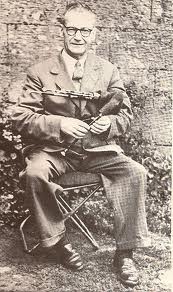Annotation:I'll Get Wedded in My Auld Claes: Difference between revisions
(Created page with "[[{{BASEPAGENAME}}|Tune properties and standard notation]] ---- <p><font face="garamond, serif" size="4"> '''I'LL GET WEDDED IN MY AULD CLAES'''. AKA - "Hexham Quadrille." En...") |
No edit summary |
||
| (14 intermediate revisions by 4 users not shown) | |||
| Line 1: | Line 1: | ||
{{TuneAnnotation | |||
|f_tune_annotation_title= <this field must be exactly the title in the URL – for example: https://tunearch.org/wiki/Annotation:Jackie_Layton > | |||
< | |f_annotation='''I'LL GET WEDDED IN MY AULD CLAES'''. AKA and see "[[Bride Next]]," "[[Hexham Quadrille]]," "[[I'll get Wedded in My Old Clothes]]," "[[My Wife She canno be Guided]]," "[[My Wife's a Wanton Wee Thing (1)]]," "[[We'll all be wed in our old claes, we canna tell when we'll get new]]." English, Scottish; Jig. England, Northumberland. G Major. Standard tuning (fiddle). AABBCC. While a part of the core Northumbrian repertoire (c.f. Billy Pigg's recording), it is more properly categorized as a Borders tune. The title (as "We'll all be wed in our old claes") appears in Henry Robson's list of popular Northumbrian song and dance tunes ("The Northern Minstrel's Budget"), which he published c. 1800. Scottish versions are more numerous under the "[[My Wife's a Wanton Wee Thing (1)]]" title, by which the tune is usually known. Matt Seattle remarks that the title "I'll get wedded in my auld claes" is a local Northumbrian lyric set to the tune, and that it which was recorded by musician and collector John Bell in the 19th century. | ||
'''I'LL GET WEDDED IN MY AULD CLAES'''. AKA | |||
<br> | <br> | ||
<br> | <br> | ||
[[File:billypigg.jpg|200px|thumb|left|Billy Pigg]] | |||
The jig has also been played by Cape Breton musicians who had it independent of Robin Williamson's book (from which many 'revival' fiddlers learned the tune). Stan Chapman, an influential teacher and fiddler from nearby Nova Scotia, learned it from an old tape of Washabuck, Cape Breton, fiddler Joe MacLean. | |||
'' | |f_source_for_notated_version=Northumbrian small-pipes player Billy Pigg (1902-1968). | ||
|f_printed_sources=Williamson ('''English, Welsh, Scottish and Irish Fiddle Tunes'''), 1976; p. 38. | |||
|f_recorded_sources=Leader Records LEA 4006, "Billy Pigg, The Border Minstrel" (1971). | |||
Rounder CD 7040, Stan Chapman – "MacKinnon's Brook: Traditional fiddle music of Cape Breton, vol 4" (2009). | |||
Mike Herr & Jill Smith – "The Quiet Path" (2014). | |||
|f_see_also_listing=Alan Snyder's Cape Breton Fiddle Recordings Index [http://www.cbfiddle.com/rx/tune/t4773.html]<br> | |||
}} | |||
------------- | |||
<br> | |||
---- | |||
Latest revision as of 05:01, 23 March 2020
X: 1 T:I'll get wedded in my auld claes R:Jig O:England M:6/8 A:Northumbria F:http://trillian.mit.edu/~jc/music/abc/mirror/kirby98.fsnet.co.uk/he/Hexham_Quadrille_1.abc K:D A |\ dcd AFD | FED B,2A, | DEF FED | DFB ABc | dcd AFD | FED B,2A, | DFA A,CE | FDD D :| |: FA |\ G2E C2A, | D2F A2F | GBG ECA, | DFA dce | dAF DFA | BGE B,DF | GEC A,CE | FDD D2:| |:A|\ AFA dfd | BGB e2d | c2A ABc | dfe dcB | AFA dfd | BGB e2d | c2A GFE | FDD D2 :|
I'LL GET WEDDED IN MY AULD CLAES. AKA and see "Bride Next," "Hexham Quadrille," "I'll get Wedded in My Old Clothes," "My Wife She canno be Guided," "My Wife's a Wanton Wee Thing (1)," "We'll all be wed in our old claes, we canna tell when we'll get new." English, Scottish; Jig. England, Northumberland. G Major. Standard tuning (fiddle). AABBCC. While a part of the core Northumbrian repertoire (c.f. Billy Pigg's recording), it is more properly categorized as a Borders tune. The title (as "We'll all be wed in our old claes") appears in Henry Robson's list of popular Northumbrian song and dance tunes ("The Northern Minstrel's Budget"), which he published c. 1800. Scottish versions are more numerous under the "My Wife's a Wanton Wee Thing (1)" title, by which the tune is usually known. Matt Seattle remarks that the title "I'll get wedded in my auld claes" is a local Northumbrian lyric set to the tune, and that it which was recorded by musician and collector John Bell in the 19th century.

The jig has also been played by Cape Breton musicians who had it independent of Robin Williamson's book (from which many 'revival' fiddlers learned the tune). Stan Chapman, an influential teacher and fiddler from nearby Nova Scotia, learned it from an old tape of Washabuck, Cape Breton, fiddler Joe MacLean.

